FREE 2021 SOUVENIR EDITION

The Golden Age of Railroading isn’t just remembered, it’s back again!

 Photo by Dave Schauer, used with permission
Photo by Dave Schauer, used with permission


The Golden Age of Railroading isn’t just remembered, it’s back again!

 Photo by Dave Schauer, used with permission
Photo by Dave Schauer, used with permission
We are so very glad you are reading this while enjoying a ride on our North Shore Scenic Railroad. Thank you!
Getting here wasn’t easy, and I’m not just talking about the I-35 construction that greeted many of you on your way into Duluth. We all worked very hard to be here. You learned what social distancing really means. We all grew very tired of facemasks, no matter how wonderfully creative some of them could be. If I never attend another Zoom, Webex, Google Meets, or Webinar again, my life will be complete.
Because of some very hard work by our volunteers and staff, and support from the state of Minnesota, the CDC and the St. Louis County Health Department, we were able
to run our railroad on a limited basis last year and be back SAFELY this year. It wasn’t easy and our operation was among a very small number of tourist railroads that turned a wheel in the last 12 months.
In fact, if you wanted a train ride last summer and fall, there were only three places in the Midwest that you could go. We were one of them. Even as times improve, we are still adhering to the same strict protocols that made for a SAFE season last year and again this year. Thank you for doing your part to help us out.
History has a predictable way of repeating itself. We feel that will bode well for the passenger railroads, Amtrak and tourist trains, here in America. Following the horrible pandemic of 1918, railroads rebounded that next year and recorded their highest number of passengers ever! Nine years later it was the Great Depression and the railroads survived that as well.
Railroads have survived the worst of times. Trains have been slowed by horrific weather, falling mountains, fires, labor strife and stopped in their “tracks” by financial ruin. The ability to sur-
vive is due to their sheer size. Huge armies of workers built the railroads, mammoth machines were invented to carve out rightof-ways and steam locomotives became the most power engines on earth. Today, long trains pulled by mighty diesels are more modern, clean and efficient.
As our world focuses on the environment, railroads are becoming even more vital. With the exception of maritime traffic, railroads have the lowest carbon footprint of any form of transportation for people or product. Railroads helped build our great nation and are keeping us strong and moving forward.
With deep appreciation to our volunteers, our staff, community partners and mostly you, we are able to continue as a working piece of railroad history. The North Shore Scenic Railroad survives to remind you of your favorite train rides from the past or to make a memory for someone taking their first train ride today.
The Golden Age of Railroading isn’t just remembered, it’s back again! Thank You!

FRONT COVER: North Shore Scenic Railroad’s #245 is a GP9 locomotive seen here pulling the Duluth Zephyr along the Lakewalk between downtown Duluth and the shore of Lake Superior. The engine was built in 1956 for the Northern Pacific Railroad and saw service here in Duluth and across the NP system all the way to the West Coast. The engine is back to its original NP number. Photo by David Schauer
AT LEFT: Northern Pacific engine #245 served the Burlington Northern after the 1970 merger, which included the Great Northern and CB&Q. She was retired in 1995 because of another merger, this time BN with the Santa Fe. Here she is working the yard in Staples, Minn., on Sept. 4, 1989 renumbered postmerger to #1868. Photo by Steve Glischinski, used with permission

How did she know? Upon visiting a Harvey House, a traveler sitting down for a meal was greeted by one of the charmingly single Harvey Girls, the idea of British born restaurateur Fred Harvey. He is credited with civilizing the West in the late 1800s with his chain of eating houses along the Santa Fe railroad.
Arriving off the train for a meal, a waitress would seat you and take your drink order; coffee, hot or iced tea and milk were on the menu. After just a few minutes one or two other waitresses would come and fulfill your beverage order. The second waitress had not spoken to the first but knew exactly what you wanted. How was this done? Clairvoyance? Some sort of magic that could fool Penn and Teller? No!
The waitresses were just following a simple, system-wide cup code. The first waitress would adjust the coffee cup at each place setting to indicate what beverage was ordered.
● Cup upright on saucer: Coffee
● Cup upside down on saucer: Hot Tea
● Cup upside down but tilted against the saucer: Iced Tea
● Cup upside down and placed away from the sauce: Milk
The Harvey House went the way of Howard Johnsons. The arrival of the dining car changed the way travelers enjoyed a sumptuous repast. Dining car

cuisine and service set a standard of excellence that unfortunately only exists on Elegant Dinner Trains like ours on the North Shore Scenic Railroad.
Said in the voice and tone of a 1940s Radio Announcer: Moving along in Music and Song, we’ll be right back after this word from our sponsor. (In this case a newspaper ad for a famous Minnesota Product)

That dated marketing scheme, messaging women that their Bisquick biscuits could beat their mother-in-law’s and their husbands would never know the difference, cleverly propelled the product for decades. Furthermore, Bisquick’s invention led to other instant products made by the rapidly growing Minneapolis food giant General Mills.

The home of Gold Medal Flour, General Mills began as the Washburn Crosby flour milling company that grew up along the banks of the Mississippi River in Minneapolis starting in 1866. Inventions like Bisquick and cold cereals, Cheerios and Kix, revolutionized the way America was eating. That change all started with Carl Smith.
This early newspaper ad shows a beaming young bride sitting down to dinner with her husband and her gray-haired mother-inlaw. The man has just complimented his mother on her delicious baked biscuits.
“They must have taken you hours to make,” he says. Oh, but he is so wrong, as husbands often are.
“Your wife made these,” his mother says. “She whipped them up in just 90 seconds.”
The caption under the photo reads: “NOW! Anybody is a
Smith was a traveling sales executive for General Mills. One late evening in 1930 he was on his way to San Francisco and was hungry. The restaurant was closed but Smith, a smooth talking salesman, convinced the tired chef to make something quickly that was not too much trouble. In short order the chef served up a plate of piping hot, delicious biscuits.
When Carl asked how the chef had produced them so quickly the chef revealed his secret. It was a pre-mixed blend of lard, baking powder, flour and salt that he stored in an “ice chest,” we would call that a refrigerator today. Using the batter, the
chef was able to bake up delectable homemade biscuits in just a matter of minutes instead of hours.
In the 1930s this was a totally new concept. Instant cake, muffin, cookie and biscuit mixes didn’t exist. At least not until Carl Smith gets back to Minneapolis where he took the instant food idea to Charlie Kress, a scientist working for General Mills. After several failed, soggy attempts there came a breakthrough.
The chef’s original recipe was modified using hydrogenated oil, thus eliminating the need for refrigeration.

The new product called Bisquick was on grocery shelves the very next year. It’s “instant” success led to other packaged foods that replaced baking from scratch. Mothers-in-law would now be looked upon quite differently
by young brides... well maybe not.
So where did this great idea come from?

The name of the late night chef is lost to history. But we do know where Carl Smith was when the lightbulb above his head lit up
as he enjoyed those quickly made biscuits. He was on his way from Portland, Oregon to San Francisco…… By Train. The clever chef was a baker on board a Southern Pacific Railroad dining car.


And just that “quick,”
if you work it hard enough it always comes back to the Railroad.

NOTE: The SP had several named trains on the route between Oregon and California. But Carl Smith probably bought his ticket on the Cascade. In 1926
Southern Pacific completed the Natron Cutoff between Eugene, Ore., and Weed, Calif. The new, shorter route became their mainline and in that year they inaugurated the Cascade as a premier overnight express from Portland to Oakland/San Francisco. As a General Mills executive with an expense account Smith was probably on the overnight Cascade, which would explain why the dining car was closed.
It’s elementary my dear Watson…..

Duluth is a tourist destination for many reasons...
Cooler by the Lake summer temperatures when the rest of the Midwest is melting.

We’re a city that welcomes visitors with a friendly wave.

Being here will shore up and refresh your spirit.
Duluth is a tourist destination for many reasons. The first of which is that tall drink of water that is Lake Superior. The largest body of fresh water on the face of the earth, Lake Superior is the place to
be and its welcome mat is the Lakewalk. For seven and a half miles this paved pathway stretches from the Duluth Ship Canal, around the corner of the Lake to Brighton Beach.
Using the North Shore Scenic Railroad’s 100-foot right-of-way along the shore of Lake Superior as a corridor, the City of Duluth was able to build the Lakewalk between the train tracks and the water’s edge. This was done with a unique agreement between the City and the St. Louis & Lake Counties Regional Rail Authority, which owns the property.
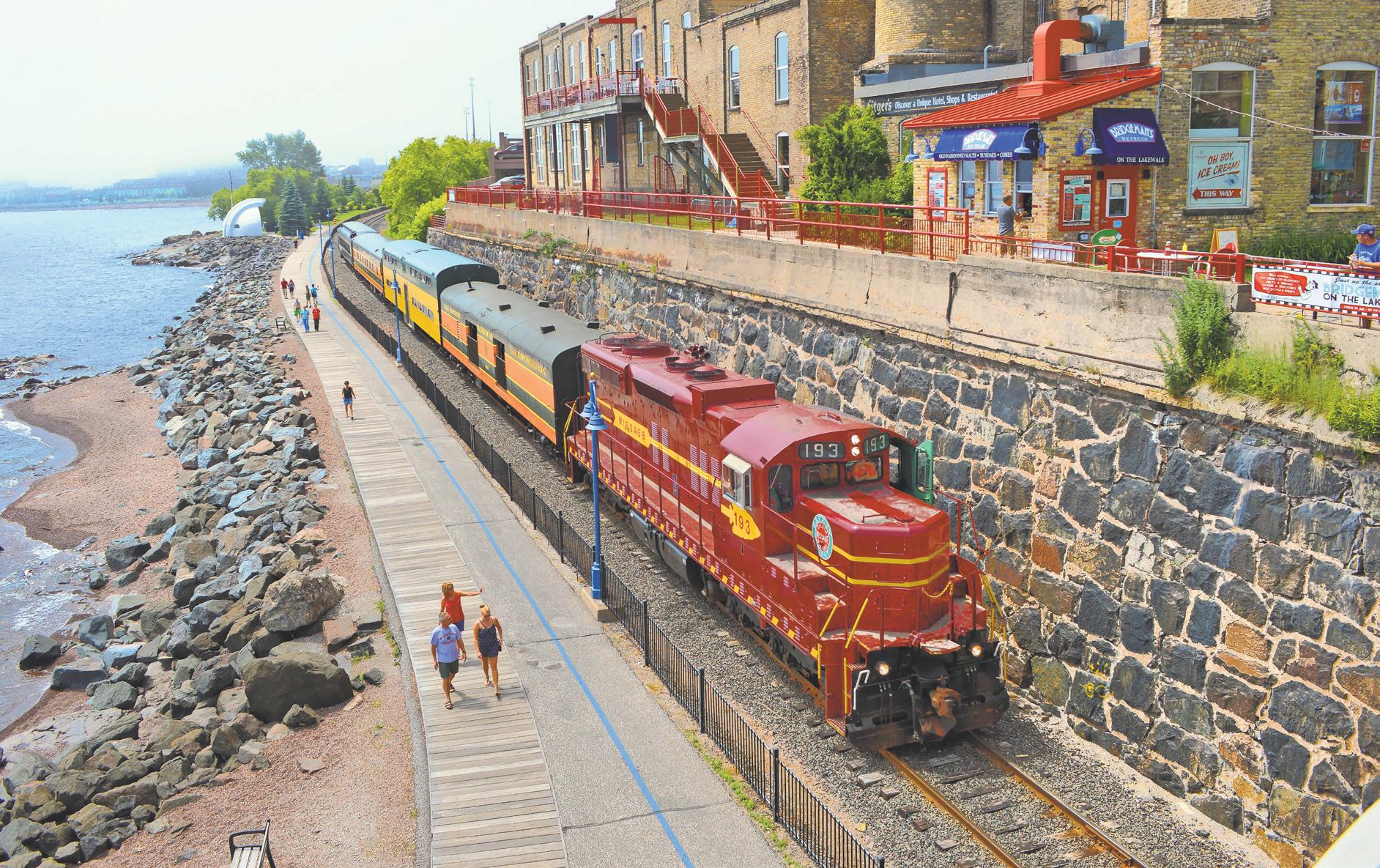


Besides being a yearround attraction, the Lakewalk is also a place of remembrance. There are two areas of hallowed ground honoring veterans who saw duty in Vietnam and Korea. These two war memorials honor the men and women from the Northland who served and sacrificed overseas.
The North Shore Scenic Railroad proudly helped add to one of the memorials when in 2014 the USS Duluth Crewmembers Association, working with the St. Louis County Historical Society, obtained the ship’s huge anchor after the Navy decommissioned the vessel. The USS Duluth served five tours in Vietnam

and the decision was made to preserve the anchor in her namesake City. But at 14 tons and 28 feet wide, how to get it in place?
Two Duluth companies and our Railroad figured it out.
To all the veterans riding with us today…. Thank You for Your Service!
Bent Paddle, Castle Danger, Earth Rider, Ursa MinorKraus Anderson and Viant Crane work with a crew of volunteers from the North Shore Scenic Railroad to lift, move and put in place the anchor from the USS Duluth. Photo by Bob King, Duluth News Tribune
The golden age of railroading isn’t just remembered here… its back again!


The railroads have a long history of delivering a firstclass experience for their passengers. Throughout the generations, guests have been treated to fine dining, deluxe sleeping accommodations, and exquisite service.
At the North Shore Scenic Railroad, I’m proud that we can offer at least a small taste of this legacy from the golden-age, first class experiences.
We are excited to be offering first class service options on almost all of our trains this summer. This includes our Dome Car seating, lounge space, fine dining experiences, and some extra service options for those interested in paying just a little more for a unique experience.

Later in August, guests can ride “first class” on the evening train, and have a fine dining four-course meal prepared by the best chefs Duluth has to offer, all while enjoying moving scenery out the window. The Elegant Dinner Train runs Fridays and Saturdays throughout


late summer into fall, and gives guests a unique dining experience found nowhere else in the Twin Ports.
Just these few of the many options of excursions on our railroad make it a truly unique attraction here in Duluth. We hope you will come back later this year or in the years to come and try one of our many excursions.













 By Ken Buehler
By Ken Buehler
It’s a hot, sticky day. Your mouth is as dry as a Texas creek bed in August. To quench your thirst, you reach for an ice cold bottle of good ol’ clear, fresh water. Remember when water came from the tap? The U.S. bottled water market took off in the 1970s with the introduction of imported Perrier. Today bottled water represents the second most popular commercial beverage sold.
There was a time when good water wasn’t readily available. The earliest inhabitants didn’t settle in areas with bad water, or no water at all. That changed when trains started taking people to, and through, places they wouldn’t normally go because of the water.


Northern Pacific Railroad knew where there was good water. It came from western Minnesota at a place called Detroit Lakes. Big DL was a spring-fed lake. Its water was remarkably clear and pure. The

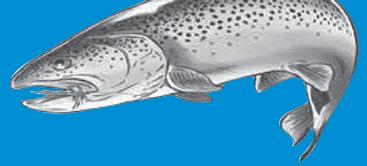


water had an acidic quality that kept plant and algae growth to a minimum. Come winter DL was the perfect ice machine. For years the NP harvested vast amounts of ice in huge blocks that were stored under sawdust in a giant warehouse along its tracks on the shore of Detroit Lake. The ice was shipped west to stock refrigerator cars to bring fruits and vegetables to markets where oranges, bananas, pears, lettuce, tomatoes didn’t grow, or grow year round.

It wasn’t just frozen DL water that was used by the Northern Pacific, they harvested the liquid variety as well. The water from Detroit Lake was considered of such high quality that it was served exclusively to guests in the NP’s dining cars.




The largest aquifer feeding Detroit Lake is near the north shore, at a place called Pokegama Springs. Translated from Ojibwa, pokegama means “by the side of the lake.” The Fargo – Detroit Lake Ice Company tapped the spring and supplied NP with bottled water to augment their winter only ice harvesting.
But as water purification became more common, and today’s bottled water craze had yet to materialize, water from anywhere could be used on the diners. Northern Pacific’s first use of bottled water proves once again…..if you work it hard enough it all comes back to the railroad!

Due to health and safety concerns around the world, the Island of Sodor was on lockdown and Thomas and Percy stayed home and worked exclusively for Sir Topham Hatt shunting cars around the yard and to the docks. There were some mainline runs with Annie and Claribel, but with most people staying close to home there weren’t many passengers.
All that has changed for the better and Thomas has resumed his summer vacation plans and will return





to Duluth the first two weekends in August to pull trains on the North Shore Scenic Railroad with his best friend Percy. Tickets to A Day Out With Thomas are available at www. duluthtrains.com.
Other special rail events for families are also coming back this year. The Great Pumpkin Train is scheduled for Oct. 21-24 with several trains each day to our Pumpkin Patch at the end of the line. Then for the Holidays, the Christmas City Express returns on the four weekends after Thanksgiving.




Hours: June through September: Friday: 12 - 3





Saturday: 10 a.m. to 4 p.m & Sunday: 12 - 3
 By Ken Buehler
By Ken Buehler
Minnesota’s first discovery of Iron Ore was on Lake Vermillion. Following the Civil War there had been a gold rush to the area. But the “gold in them thar hills” proved to be iron pirate, a worthless, yellow mineral resembling gold. What was discovered instead were rich veins of hematite, a pure form of iron ore that was just what the new blast furnace technology in the Monongahela Valley was desperately craving to make steel.

Charlemagne Tower, a Philadelphia lawyer and capitalist, who bet on the winning side in the Civil War and prospered, was interested in opening a mine and building a railroad to extract the ore. Over the winter of 1880, his Duluth & Iron Range Railroad surveyed the shortest route between the mine, near a town now named Tower, and the shore of Lake Superior. It was 68 miles to Agate Bay, or as we know it today, Two Harbors.
Built as a company town, Two
Harbors was the starting point for the railroad. At the direction of Mr. Tower, the D&IR attempted to control the sale of lots in the new town of Two Harbors to insure their acquisition only by men who intended to build on them and live in the community. That didn’t keep out the speculators. Soon a shanty town sprung up with every kind of nefarious activity intended to separate the early railroad workers from their paychecks.
To put an end to this the Railroad set up the Township of Two Harbor in 1885. A church was
established by Presbyterians in 1887 and the Town of Two Harbors was incorporated a year later. The Railroad made sure that in 1889 Two Harbors was named the Lake County seat, beating out Beaver Bay farther up the shore.


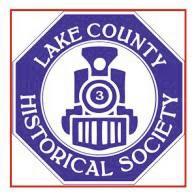

Two Harbors is a delightful North Shore tourist destination that was built by an historic railroad that is today a Canadian National RR property. The CN still brings iron ore to the ships that transport it to the waiting steel mills.
VILLAGE continued on PAGE 11
Monday: Roast beef dinner $7.95

Tuesday: Turkey dinner $8.95
Friday: Country fried steak & eggs $8.95
Country fried steak dinner $7.95
Featuring our own
• Homemade pies50 kinds!
• Cranberry wild rice bread
• Sourdough dinner rolls & hamburger rolls.


Remnants of Two Harbors railroad history are everywhere. The Railroad’s Pork City Hill area is now a very nice housing development.
The First Presbyterian Church remains the city’s oldest continuing congregation. To get the best view of the docks and the ore boats, take the short walk from the train station/museum to Paul Van Hoven Park.
Van Hoven was president of the Duluth, Missabe & Iron Range Railroad (a D&IR successor) from 1944 for nearly 10 years. The park is built around the former D&IR general merchandise dock where the historic railroad tugboat Edna G. is docked today.
Railroaders smoked a lot of cigars. In 1900
John H. Kallin opened the Two Harbors Cigar Factory across the street from where Castle Danger Brewery is today. Demand for cigars skyrocketed to 30,000 a month. In 1907 Ed Sorenson opened his own cigar factory, also in Two Harbors.

The Railroad opened a Community Center
Camp House was built by the Railroad Y.M.C.A., mostly for the children of employees. This is from the third week of “Girls Camp” in 1937 taken in front of bunkhouse #2. Most of the children’s camp visits were paid for through a collection taken up from Railroad employees. On the first rainy day of camp youngsters wrote letters to the workers thanking them. The camp still exists today under different ownership. Lake Superior Railroad Museum Archives

in 1898 that became affiliated with the Y.M.C.A. In 1923 the Railroad-supported Y.M.C.A. partnered with the Salvation Army and opened Camp House on George Lake, 35 miles



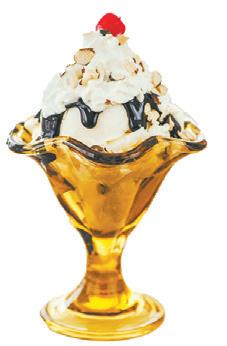
north of town along the tracks of the D&IR. The camp was named after Francis E. House, president of the D&IR from 1901 to 1926.
Lighthouse Point was railroad property where

the Coast Guard built the harbor entry light. It’s now owned by the Lake County Historical Society and operates as a popular B&B.

Your visit to Two Harbors is just a taste of what awaits you upon your return. For information on the area and lodging contact the Lake County Chamber of Commerce, www. lakecounty-chamber. com.



Trains run from the Depot NOVEMBER 26 - DECEMBER 19
It’s the story of a young girl traveling by train to visit her grandparents in Duluth on Christmas Eve. The story is performed in the Railroad Museum at the Depot starting with live music and carolers against a backdrop of decorated trains and storefronts. Then take a train ride past the lights of Bentleyville and along the edge of Lake Superior with hot cocoa and cookies.
A special guest will visit and have a magical gift for every passenger!
Chosen one of the “BEST Christmas Train Rides in America” by MSN www.duluthtrains.com for tickets or call 800-423-1273
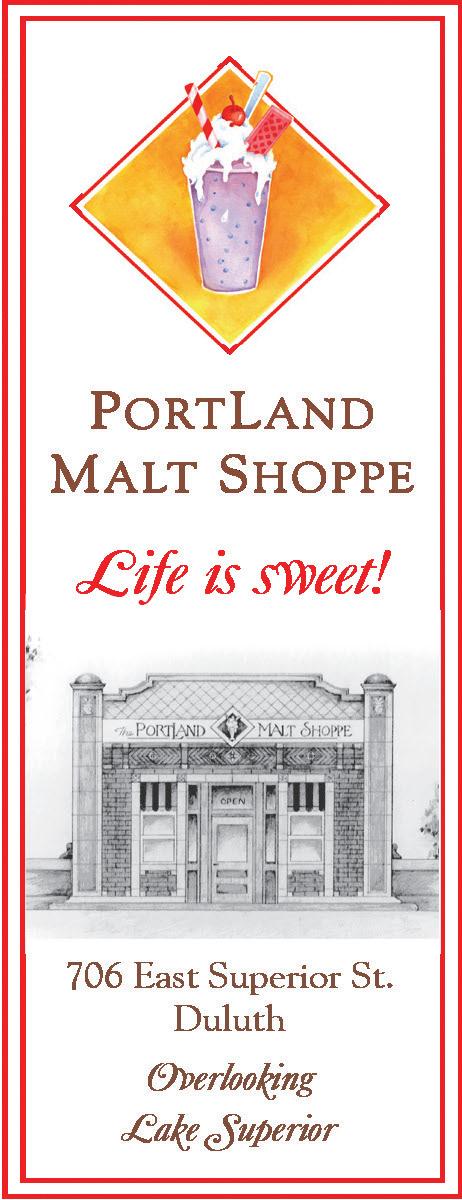
Sponsored by:



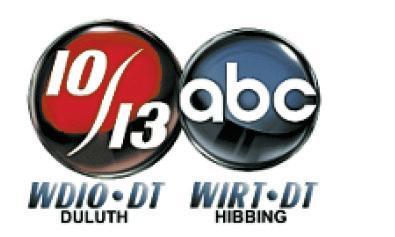
Thank you for riding with us today on the North Shore Scenic Railroad. We certainly hope you had an enjoyable time and are taking some great memories home with you. It’s what you’ve left behind that’s also very important.
We have a LOST AND FOUND Department, but that’s not important now.
What remains here, after you depart, is the continued preservation of railroad history. By being a guest/passen-
ger on a fun and educational train ride, you are supporting the efforts of the Lake Superior Railroad Museum to: preserve, interpret and present to the public the history of railroading, especially as it relates to our area.
Proceeds from the all-volunteer run North Shore Scenic Railroad are invested in the work of the Train Museum. Using full size artifacts as introductions, the Museum tells the stories of the men and women who built the railroads that built our great nation.
Your ticket makes it possible to continue restoring more pieces for the collection.
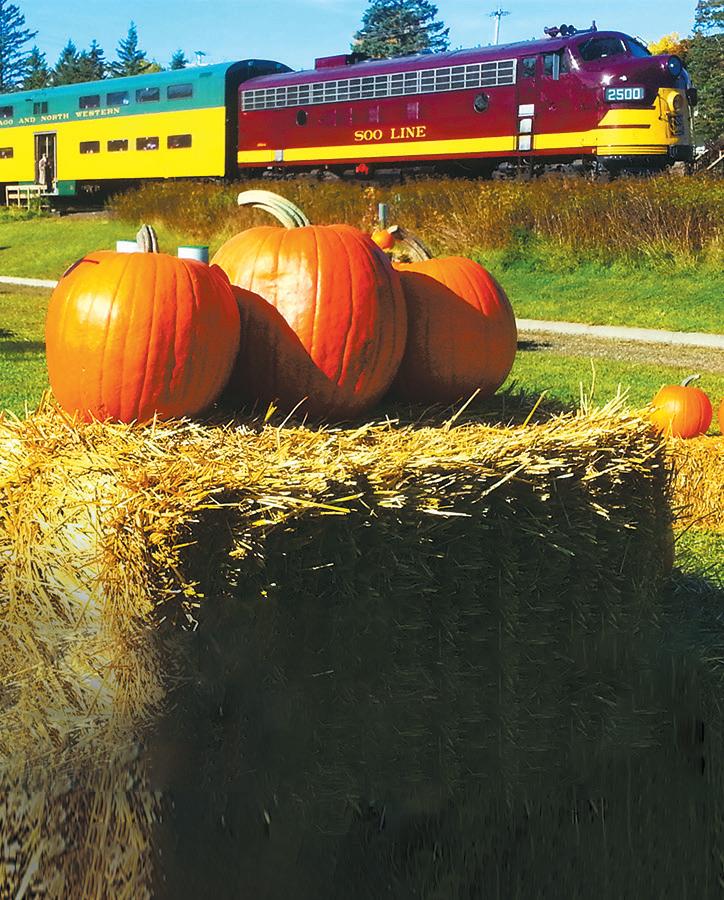
October 21-24, 2021
The #517 is the latest example of what generous donors, hardworking volunteers and railroad passengers like you, all joining togeth-
er, have accomplished. Northern Pacific Railroad purchased 18 of these chair cars from Pullman Standard late in 1946 (500 – 517). They were for the streamlined North Coast Limited. Survivor #517 came to the Museum by way of the DM&IR as its Minnesota II.
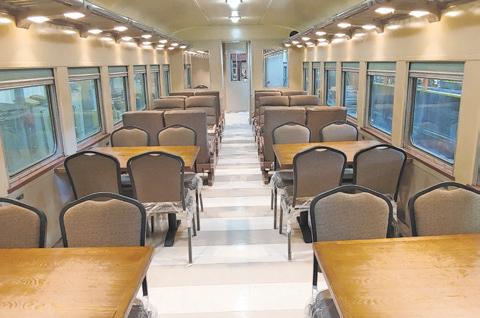
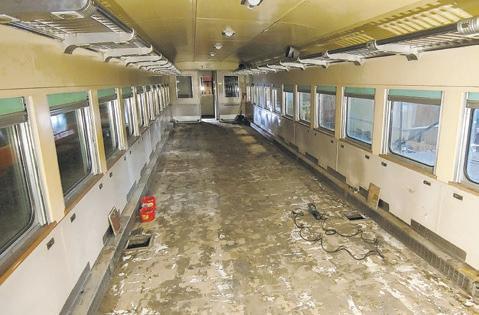

Over the winter the car was gutted and rebuilt from the tracks up.
Thanks to our donors, volunteers and you, our guest/passengers, for saving railroad history….one train ride at a time.